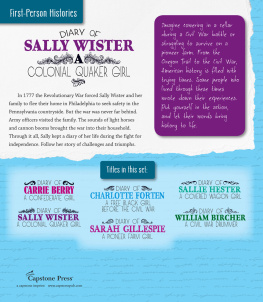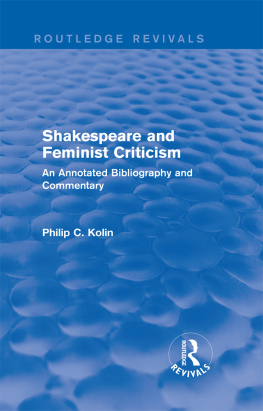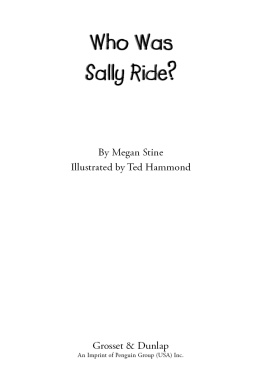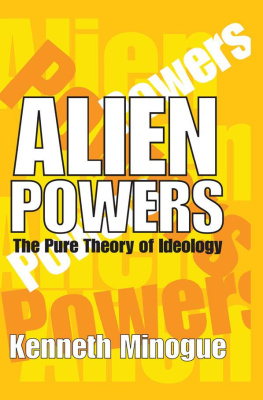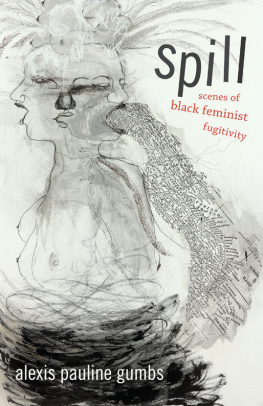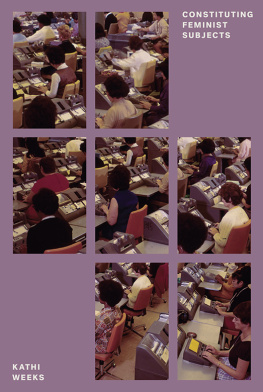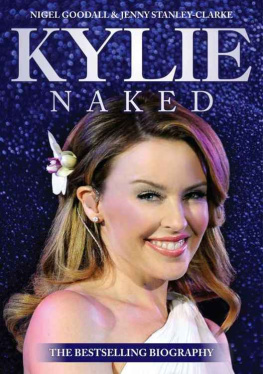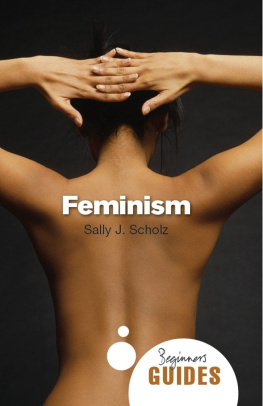ROUTLEDGE LIBRARY EDITIONS:
FEMINIST THEORY
PROBLEMS FOR FEMINIST CRITICISM
PROBLEMS FOR FEMINIST CRITICISM
Edited by
SALLY MINOGUE
Volume 24
First published in 1990
This edition first published in 2013
by Routledge
2 Park Square, Milton Park, Abingdon, Oxon, OX14 4RN
Simultaneously published in the USA and Canada
by Routledge
711 Third Avenue, New York, NY 10017
Routledge is an imprint of the Taylor & Francis Group, an informa business
Collection as a whole 1990 Routledge
Individual chapters 1990 respective contributors
All rights reserved. No part of this book may be reprinted or reproduced or utilised in any form or by any electronic, mechanical, or other means, now known or hereafter invented, including photocopying and recording, or in any information storage or retrieval system, without permission in writing from the publishers.
Trademark notice: Product or corporate names may be trademarks or registered trademarks, and are used only for identification and explanation without intent to infringe.
British Library Cataloguing in Publication Data
A catalogue record for this book is available from the British Library
ISBN: 978-0-415-53401-7 (Set)
eISBN: 978-0-203-08796-1 (Set)
ISBN: 978-0-415-63678-0 (Volume 24)
eISBN: 978-0-203-08500-4 (Volume 24)
Publisher's Note
The publisher has gone to great lengths to ensure the quality of this reprint but points out that some imperfections in the original copies may be apparent.
Disclaimer
The publisher has made every effort to trace copyright holders and would welcome correspondence from those they have been unable to trace.
PROBLEMS FOR
FEMINIST CRITICISM
Feminist criticism has come a long way in the last twenty years. Its development has been rapid, its snowball progress picking up elements of structuralism, deconstruction and psychoanalytic criticism; just as rapidly it has been shedding its own early theories and methodologies. Now it is a critical orthodoxy with its own established canonical texts. Now is the time, then, to begin to question that orthodoxy. In Problems for Feminist Criticism five women critics seek to do that, in a spirit of enquiry whose central point of focus is the literature for which feminist critics have offered a re-reading.
By reference to a wide range of writers, from Milton to the contemporary poet, with a strong emphasis on the nineteenth-century novel, the contributors ask what we may be losing from literature by adopting the feminist orthodoxy. Each chapter provides a survey of feminist critical approaches to its subject and highlights the inherent problems. The book frees the way forward for critics who have found much that is stimulating and revealing in feminist approaches to literature, but who find its proscriptiveness potentially reductive. It shows how literature may have the flexibility to absorb and benefit from new critical approaches, whilst still retaining its own life, never quite to be contained in criticism's theories and methodologies.
PROBLEMS FOR
FEMINIST CRITICISM
Edited by Sally Minogue
First published 1990
by Routledge
11 New Fetter Lane, London EC4P 4EE
Simultaneously published in the USA and Canada
by Routledge
a division of Routledge, Chapman and Hall, Inc.
29 West 35th Street, New York, NY 10001
Collection as a whole 1990 Routledge,
individual chapters 1990 respective contributors
Typeset by LaserScript Limited, Mitcham, Surrey
Printed and bound in Great Britain by
Richard Clay Ltd, Bungay, Suffolk
All rights reserved. No part of this book may be reprinted or
reproduced or utilized in any form or by any electronic,
mechanical, or other means, now known or hereafter invented,
including photocopying and recording, or in any information
storage or retrieval system, without permission in writing from
the publishers.
British Library Cataloguing in Publication Data
Problems for feminist criticism.
1. English literature. Feminist criticism
I. Minogue, Sally
820.9
Library of Congress Cataloging in Publication Data
Problems for feminist criticism / edited by Sally Minogue.
p. cm.
Includes bibliographical references.
1. Feminist literary criticism. 2. English literature-History
and criticism. 3. Women in literature. I. Minogue, Sally.
PN98.W64P76 1990
820.9352042-dc20 90-8191
ISBN 0 415 02077 8
ISBN 0 415 05029 4 pbk
To Colin
CONTENTS
NOTES ON CONTRIBUTORS
Barbara Hardy is Professor Emeritus of the University of London, and has written on Jane Austen, Charles Dickens, George Eliot, William Thackeray, Thomas Hardy, Henry James and modern novelists. Amongst her books are Tellers and Listeners: The Narrative Imagination, The Appropriate Form, The Advantage of Lyric, Forms of Feeling in Victorian Fiction and Narrators and Novelists: Collected Essays Vol. One. She is working on a book about narrative in Shakespeare and on the second volume of her collected essays.
Sandra Hopkins read English at King's College, London. She is a part-time tutor in Literature in the Department of Continuing Education at the University of Bristol, and also a tutor on The Open University's Nineteenth-century Novel course.
Mara Kalnins is Principal Lecturer in English at Leicester Polytechnic. She is an editor for the Cambridge Critical Edition of D. H. Lawrence and has edited Apocalypse and the Writings on Revelation (1980), Aaron's Rod (1988) and Sea and Sardinia (forth-coming). She has also edited D. H. Lawrence: Centenary Essays (1986), Some Noble Theme: Essays on Aspects of Romanticism (forth-coming), and is at present writing a critical study of Lawrence's late works and preparing a selection of his poetry for higher education students.
Barbara K. Lewalski is the William R. Kenan Professor of English Literature and of History and Literature at Harvard University. Her recent books and articles on Renaissance topics include: Protestant Poetics and the Seventeenth-century Religious Lyric (1979) and Paradise Lost and the Rhetoric of Literary Forms (1985). Amongst her current projects is a book on women in seventeenth-century England, Writing Women in the Jacobean Era.
Sally Minogue is co-author, with Colin Radford, of The Nature of Criticism. She is currently working on a book on poetic language examining the inclusion and exclusion of the demotic voice, the voice of everyday experience, in English poetry The Dialect of Common Sense. She teaches English halftime at Thanet Technical College, and part-time at the University of Kent.
ACKNOWLEDGEMENTS
I'd like to thank Jan Montefiore for her generosity, my brother Martin, and my dear friends Gay Mitchell and Mandy Rose for their constant support. My profoundest debt, as ever, is to Colin Radford, for many things, but most for his unfailing faith.





